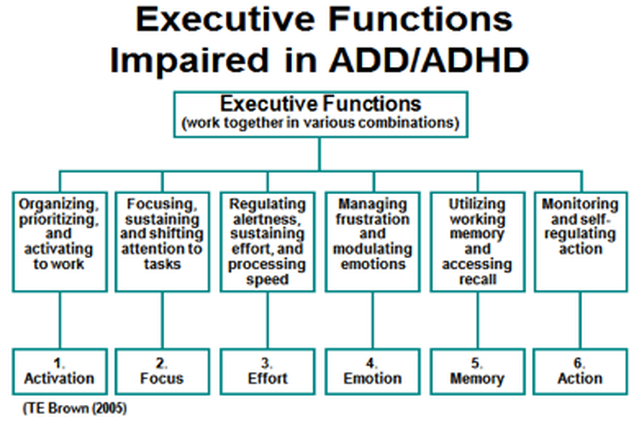Attention Deficit Hyperactivity Disorder : An Introduction


Image Credits: Posted on an a blog by Ashley Philips at Rice University. Created by finuccinialfredo.I don't own this image. All credits to the creator.
Like Autism Spectrum Conditions (ASCs), Attention Deficit Hyperactivity Disorder (ADHD) is a neurodevelopmental condition. You're born with it: it affects how your brain and nervous system develop.
The American Psychiatric Association (APA, 2013) describes 3 core traits: inattention, hyperactivity, and impulsivity. ADHD is categorised into 3 subtypes which relate to these core traits: predominantly inattentive, predominantly hyperactive-impulsive, and combined type (a combination of the three symptom clusters). People who receive a diagnosis have a high number of ADHD traits, and these traits affect their life significantly.
So what do these words mean? To better explain the nature of attention in ADHD, let's take a look at this image.

Image Credits: Created by Dr Thomas E Brown and posted on his website. I don't own this image. All credits to the creator.
There are various models which explain what happens in ADHD brains, and as with all mental health and neurodevelopmental conditions. There is never 1 single cause.
One theory outlines how people with ADHD have impaired "executive functions" which are basically higher level cognitive processes necessary to get things done: self-control and managing behaviours. Think of executive functions like the CEO of your brain!
Inattention relates to how people with ADHD have difficulty with activation, focus, effort, emotions, working memory, and action (as described in the diagram above). It refers to difficulty with: sustaining attention, starting to pay attention, controlling what one pays attention to, organising and prioritising what to allocate your attention to, and modulating attention based on the demands of the task among other things.
Hyperactivity and Impulsivity together encompass racing thoughts, difficulty sitting still, fidgeting, always being on the go, talking excessively, inadvertently interrupting others, having trouble waiting in line, etc.
Altogether, attention affects all aspects of your life. To illustrate, emotional dysregulation is a lesser known common characteristic of ADHD which relates to difficulty shifting attention away from emotions and inhibiting/controlling emotions among other things.
Moreover, as with ASCs, there are a growing number of people who don't see their ADHD as a deficit in their own lives—myself included with regards to my own ADHD— so it is important to respect how each individual feels. That doesn't make one view of it any lesser than the next though! This sub-community affirms all perspectives on ADHD. Disorder or difference: it's up to you to decide how you feel about your own ADHD.

@jovialButterfly6752 love the post!
Interesting info on the attention aspects: "sustaining attention, starting to pay attention, controlling what one pays attention to, organising and prioritising what to allocate your attention to, and modulating attention based on the demands of the task among other things." 😀
I really appreciate the fact that you're constantly trying to learn more about mental health and other areas 7 Cups covers

@jovialButterfly6752 ![]() thanks to you for making such wonderful posts!
thanks to you for making such wonderful posts!

Hello there....
Above post is really informative and helpful for ppl who don't know about ADHD ... I guess if we don't know about the issue or disorder. We can't understand the phase under which a member is going from ..and understand helps us to respect the person ideas and lows as we pay less attention too them ; so I guess it's really helpful and acknowledging for me 😇...
Thanks for posting the forum on topic ADHD ....for listeners as well as member to understand it in a better way .... it is really helpful 🙂


I really love how you stated "there are a growing number of people who don't see their ADHD as a deficit in their own lives." That is so very true in my life. Yes, sometimes ADHD can affect my life in a way I don't want it to in that moment but all it does is teaches me how to adapt my life and it makes me stronger because of it.
Also, I don't know if it is just my account but the second picture by Thomas E. Brown is not visible just as an fyi@jovialButterfly6752

@jovialButterfly6752
Wow, I learned so much about ADHD from this post, especially of that fact that it isn't just identified by trouble focusing and fidgeting. It's much more than that under the surface! Thank you so much for sharing this with us! ❤️

@jovialButterfly6752
Interesting. Thanks for the lovely post Jov
Tagging: @kindLemonade , @HopieRemi

@azuladragon34
This is so true! What a great post. Thanks for tagging me.

